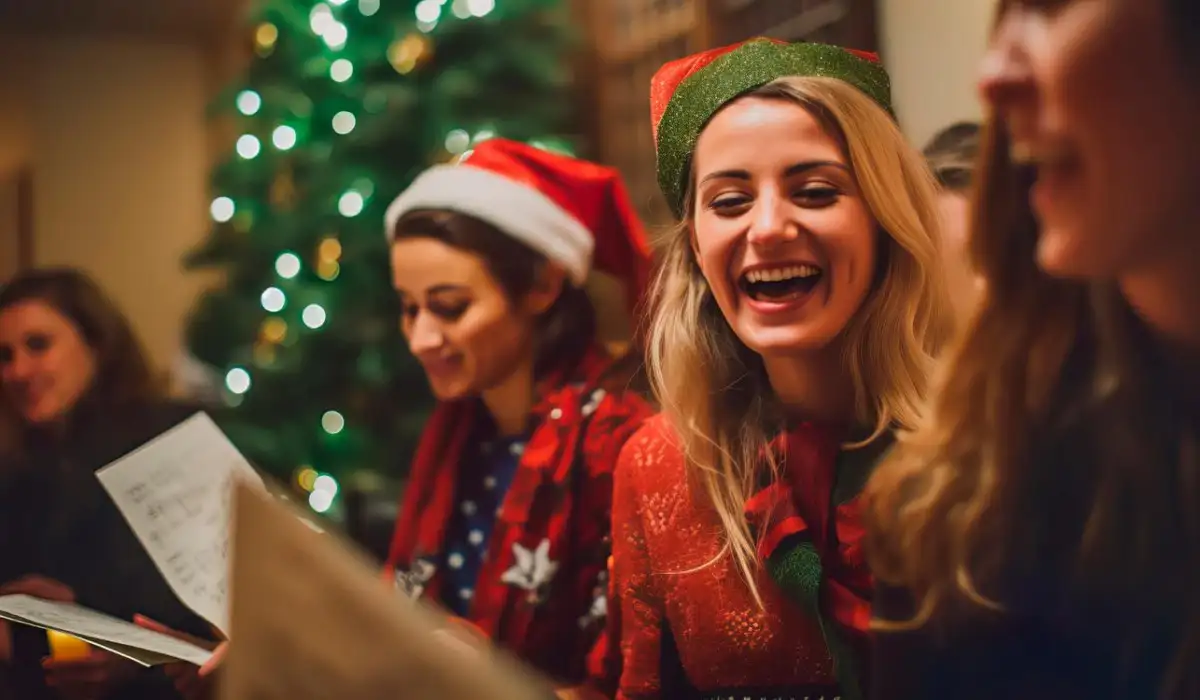Observed globally on the 20th of December each year, Go Caroling Day is a celebration that brings to life the age-old custom of Christmas caroling. The event provides a wonderful opportunity for people, both individually and in groups, to deliver holiday spirit and cheer across their communities by performing beloved seasonal songs.
From donning our coziest winter outfits and venturing out the door, Go Caroling Day is a worldwide occurrence that invites us to immerse ourselves in the festive season as our voices echo with the melody of traditional Christmas carols.
History of Go Caroling Day
Celebrated each year on December 20th, Go Caroling Day has its origin deeply set in the long-held tradition of caroling, which can be traced back to Medieval Europe. During this era, people called ‘carolers’ used to sing and perform dances in circles as a way to rejoice in the advent of spring and the winter solstice.
Interestingly, the term ‘carol’ comes from ‘carole’, an Old French word, meaning a ‘circle dance’. However, these songs were not typically related to Christmas at that time. Rather, they were communal songs, presented at various festive occasions, including those signifying the winter solstice.
It wasn’t until the 13th century that the concept of Christmas carols came into existence when nativity plays were staged in Italy by Francis of Assisi. The significant aspect of these songs was that they were sung in vernacular languages, making them more relatable to the common folk. As time went by, these songs evolved into the familiar Christmas carols we sing today.
Go Caroling Day as a celebration is intended to inspire people to preserve this age-old tradition. Traditionally, carolers used to pay visits from one neighbor to another, enchanting them with the melody of Christmas songs. This celebratory day emphasizes spreading warmth and holiday joy within local neighborhoods.
Go Caroling Day Timeline
Origins of Caroling
Caroling has origins in ancient pagan songs sung for the Winter Solstice celebrations.
St. Francis of Assisi's Nativity Plays
St. Francis of Assisi introduced Nativity Plays in Italy where songs, known as 'canticles', filled the narratives.
First Collection of Carols
A collection of late medieval Latin songs were published in Piae Cantiones.
Caroling Prohibited
Caroling was banned in England by Oliver Cromwell who thought that Christmas should be a solemn day.
Revival of Caroling
With the end of Cromwell’s rule, Christmas and caroling were reintroduced to the English culture.
Caroling Setting In Popular Movies
Movies and TV shows in the 1930s until the present began including scenes of carolers to depict the Christmas spirit.
Modern Caroling
Caroling is an important part of Christmas celebrations worldwide, occurring in public arenas, neighbourhoods, and homes.
Ideas to Celebrate Go Caroling Day
Family Caroling Night
Gather your family to sing some classic Christmas carols around your neighbourhood. You can also prepare some warm drinks like hot chocolate to share the warmth of the season.
Caroling Charity Event
Make your caroling more meaningful by turning it into a charity event. Collect donations, whether in-kind or cash, from willing givers and deliver these to deserving institutions.
Caroling Contest
Start a friendly competition by organizing a caroling contest. You can invite different groups in your community and let them showcase their talent in singing Christmas carols.
Record a Caroling Video
If you can't celebrate the day in person, try recording a video of you and your friends or family singing carols. The video can be shared online or sent personally to your loved ones.
Caroling at Local Nursing Homes or Hospitals
Spread cheer to those who may not be able to leave their homes or hospitals. Sing carols for them, brightening their day during the holiday season.
7 Interesting Facts About Going Caroling
Origin of Caroling
Caroling, also known as wassailing, began as an old English custom that started as a toast to the health of apple trees in the hopes that they would thrive in the coming year. It eventually evolved into house-to-house singing of Christmas songs.
Carols Initially Not About Christmas
Originally, carols were not about Christmas but were popular songs and dances. It was only around the 13th century that carols began to become associated with Christmas.
Oldest Christmas Carol
The oldest Christmas carol is believed to be 'Jesus Refulsit Omnium' ('Jesus, Light of All the Nations'), which was written by St. Hilary of Poitiers in the 4th century.
Door-to-Door Caroling
Going door-to-door to sing carols, traditionally known as 'wassailing', tends to be popular in the United Kingdom and in the United States, often conducted by groups of children or friends.
Banned Carols
Carols were once banned in England. During the 17th century, the Puritans under Oliver Cromwell outlawed the singing of Christmas carols due to their association with merrymaking and pagan festivities.
World Record for Carol Singing
The world record for the most carol singers gathered in one place is held by by Godswill Akpabio unity choir (Nigeria); 25,272 people gathered to sing carols together in 2012.
Favourite Christmas Carol
According to numerous surveys, 'Silent Night' is often the world's favourite Christmas carol.
Go Caroling Day FAQs
Next Go Caroling Day Dates
| Year | Date | Day |
|---|---|---|
| 2023 | December 20th | Wednesday |
| 2024 | December 20th | Friday |
| 2025 | December 20th | Saturday |
| 2026 | December 20th | Sunday |
| 2027 | December 20th | Monday |
| What is the pattern? | Every December 20th | |
Go Caroling Day Word Search
- Caroling
- Christmas
- Songs
- Melody
- Joyful
- Festive
